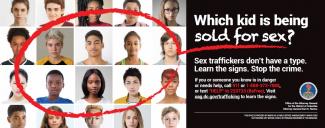Human Trafficking Fact Sheet
This fact sheet is also available in Amharic, Chinese, French, Korean, Vietnamese and Spanish.
Download this sex trafficking awareness poster in English and Spanish.
How You Can Help the District Combat Human Trafficking
What is Human Trafficking?
Human trafficking is a form of modern-day slavery and a serious crime. Traffickers use force, fraud, or coercion to make victims engage in labor or commercial sexual exploitation.
Every year, millions of people are trafficked around the world, including our own neighborhoods in the District of Columbia. Human trafficking is the second largest and fastest growing criminal industry in the world, second only to drug trafficking. Here are some important facts:
- Children account for half of the victims of human trafficking. In fact, the average age that a young person becomes involved in sex trafficking is 12 years old. If the victim is a minor, no force, fraud, or coercion is necessary to prove trafficking. Any youth under the age of 18 who is involved in a commercial sex act is considered to be a victim of trafficking.
- Sex traffickers prey on vulnerable people, especially young people, and often lure them with promises of protection, love, or adventure. They may contact potential victims through social media or approach them at clubs and bars, at school, in malls, or in metro stations.
- Labor trafficking includes situations of debt bondage, forced labor, and involuntary child labor. Common types of labor trafficking include people forced to work in homes as domestic servants and factory workers held in inhumane conditions with little to no pay.
- Victims of human trafficking are often afraid to come forward and unable to leave traffickers because of trauma, physical violence, fear of harm to their families, having nowhere else to go, or a distrust of authority figures.
If you learn to recognize the warning signs of human trafficking, you could help save a life.
Red Flags and Warning Signs
The sale of children for sex occurs worldwide, and unfortunately even happens here in the District of Columbia. If you learn to recognize the signs of human trafficking, you could help to save someone’s life.
Sex trafficking warning signs include:
- Running away from home;
- Truancy/not attending school;
- Possessing cell phones that they did not purchase on their own
- Making purchases with credit cards that do not belong to them
- Older boyfriends
- Signs of physical abuse such as burn marks, bruises, or cuts
- New tattoos (traffickers often use tattoos as a form of branding)
- Signs of gang affiliation.
Labor trafficking warning signs include:
- Is unpaid, paid very little, or paid only through tips;
- Works excessively long or unusual hours;
- Is not free to leave or come and go as he/she wishes;
- Owes a large debt and is unable to pay it off;
- Withholds of documents such as passport/security card; and
- High security measures exist in the work or living locations (e.g. opaque windows, barbed wire, security cameras, etc.)
What can you do to help?
Be alert for the signs of human trafficking. If you do see signs, do not attempt to confront suspected traffickers or victims, but please do alert the authorities.
To get help if you or someone you know is a victim of human trafficking:
- Call the National Human Trafficking Hotline: at 1-888-373-7888
- Or Text “Help” to 233733 (BeFree)
Under the Justice for Victims of Trafficking Act, child sexual exploitation is a form of child abuse. If you believe you have information about a potential child trafficking situation in the District of Columbia:
- Call the Child Abuse and Neglect Hotline at 202-671- SAFE (7233)
What is the Office of the Attorney General (OAG) doing to combat human trafficking?
OAG attorneys know that young people involved in the Child Welfare and Juvenile Justice systems are especially vulnerable to sex trafficking and have worked on behalf of victims who have been forced to exchange sex for money, food, shelter, and clothing. The Attorney General has prioritized this issue through citywide collaboration and prevention education.
The Public Safety and Family Services Divisions within OAG participate in a multi-disciplinary team that reviews cases involving youth that are involved in commercial sexual exploitation, or at risk of becoming involved. The team meets monthly to review each case and recommends services such as medical exams, mental health services, and support groups. This collaboration ensures that youth who are victims of trafficking get identified and get help.
The Office of the Attorney General is also expanding efforts to educate communities and reach out to youth to prevent involvement in human trafficking and encourage reporting it.

